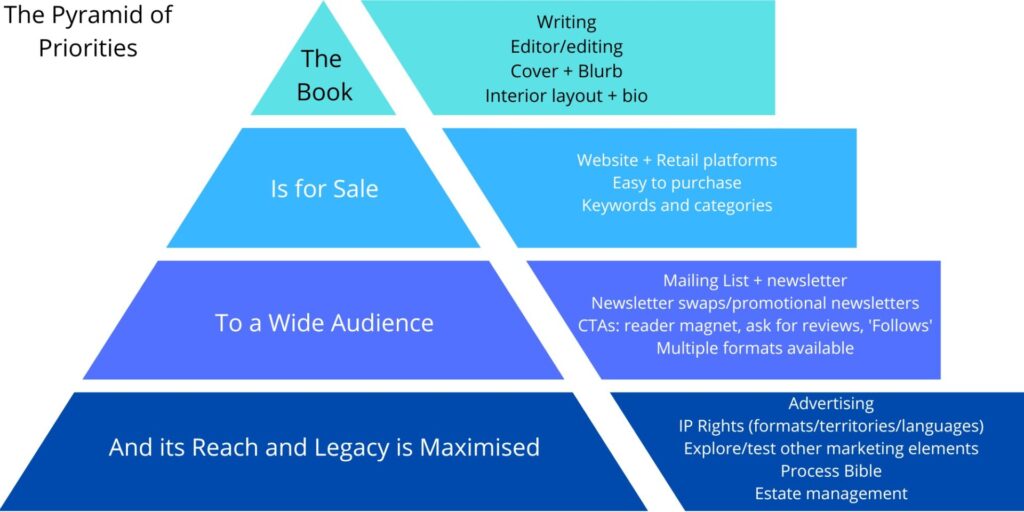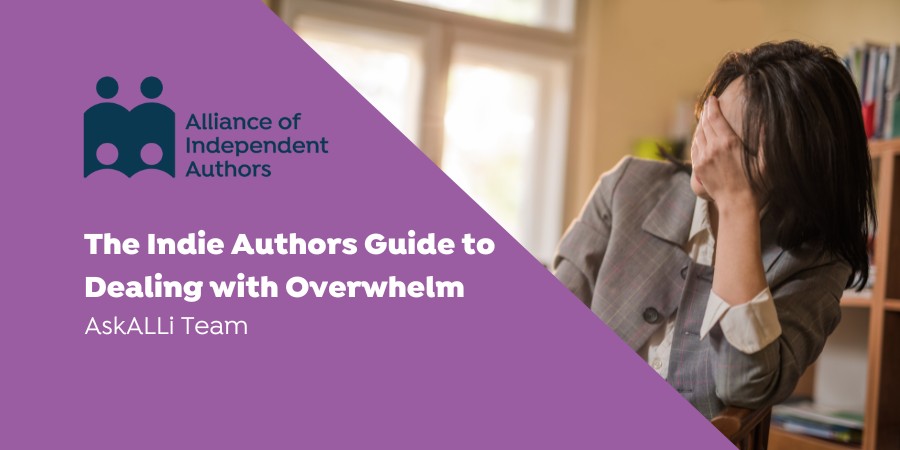Being an indie author is a lot of work and no one said it would be easy. Which is undoubtably why so many of us, at all stages of our publishing, can come down with overwhelm. Overcoming overwhelm is vital to the health of your business, your ability to continue writing and your own self-care. The Alliance of Independent Authors (ALLi)'s “Self-Publishing for All” campaign is an ongoing effort to open access to self-publishing to more individuals and communities, with a remit to remove as many physical, mental and financial barriers to self-publishing as possible, while sharing good quality advice freely and broadly. As part of this campaign, Melissa Addey, ALLi's Campaigns Manager, has been talking to indie authors about Overcoming Self-Publishing Overwhelm.
Find out more about the Self-publishing for All Campaign and its resources here. The AskALLi team thanks its members for their contributions to today's post:
Overcoming Self-Publishing Overwhelm: ALLi's Campaigns Manager Melissa Addey and Blog Manager, Sacha Black

Melissa Addey, ALLi Campaigns Manager
Melissa: One of the first things someone said to me around publishing accessibility was that ALLi sends great information but sometimes, as a neurodiverse author, it's just too much and adds to a sense of overwhelm. That overwhelm comment really stuck with me. Overwhelm is obviously much worse for neurodiverse authors but I also think a lot of authors (and entrepreneurs, with whom I worked for many years) get this: you love the work so you don't stop, you don't take a break, also you try to do ALL THE THINGS… and it's too much.
Sacha: Ooft, I completely get that statement. I am one of those authors who wants to do “all the things” and do them yesterday and “what do you mean I only have six hours a day to work?”! We have a wonderfully supportive and information filled community, and I think one of the issues is that there's no single process suits all. Even for neurotypical people, there are so many options for marketing, and writing a book and it's very easy to look at the “you need to this or that” type of comments and assume one size fits all when that's really not the case. To manage all of that when you're also neurodiverse, when all the information is aimed at neurotypical authors, must indeed be incredibly difficult.
Overcoming Overwhelm: Embrace Limits
Melissa: Absolutely. As authors and entrepreneurs, we have to learn to embrace our limits and manage our expectations of what's possible for us as individuals. We have to think whether something does actually sell books for us. We all have other stuff going on in our lives (neurodiversity, caring responsibilities, a desire to stop and smell the roses!) so rethinking how much we do and what works best for us is vital. Sometimes we can manage more, less, or need something different–we need to get better at recognizing that.

Sacha Black, ALLi Blog Manager
Sacha: I totally agree, even though hearing that makes me squirm. I don't want to hear it because I'm hungry and ambitious, but equally, sometimes the messages that make us squirm the most are the ones we need to listen to the hardest. I realized that this August. My child was on summer holidays and instead of being able to take time off (time I also needed to rest in), all that happened was a cluster fudge of me having to work excessive hours and scrambling to get more childcare because we were out of the country for so long. I don't want to live like that. So I'm reorganizing my business to work longer hours during term and to have all the holiday times off. That's my new limit, my boundary. I am trying to accept that.
Overcoming Overwhelm: Do It Your Way
Sacha: Exactly, like I'm moving towards planning my year in “septiles” to match the school terms rather than business quarters as I used to.
Melissa: And for some people, managing a whole team of services is just too much. And they might be better off having a ‘done for you' service. ALLi is now working on a slimmed-down guide to self-publishing that really simplifies the steps while being sure to include all the steps (neurotypicals often leave out bits they think are ‘obvious' which is not helpful).
I spent half the summer holidays trying to write as well as look after the kids and it was just stressful. And I thought, why do I work for myself if I can't manage things the way I want them? And so halfway through I shut down my creative writing expectations: I kept things ticking over that needed looking after and I felt so much better: I didn't feel I was ‘failing', I felt like I'd made a strategic decision. There's a very big difference and I think it's important for your mental health. Yep, my next book will be delayed by a month or so… but it's not the end of the world.
Overcoming Overwhelm: The Pyramid of Priorities

The Pyramid of Priorities
Melissa Addey has created the “Pyramid of Priorities”, one way to think about the job of being an indie author. If the breakdown or order doesn't suit how you structure your business, modify to fit. We've included blank, customizable ones which are available here and here. If you're feeling overwhelmed, use the templates to make a pyramid that works for you.
The idea is, if you have a load of energy and time and resources, go for it and do everything! But if any of time or energy or resources shrink, for whatever reason, and you're feeling overwhelmed move up the pyramid. The higher up you go the more of a priority the work is. This way, no matter how far up the pyramid you are, you know you're always doing the most important things.
Overcoming Overwhelm: ALLi's Publishing Production Manager, Dan Parsons
Daniel Parsons, ALLi Publishing Production Manager
Dan uses what he calls a “just in time”, not “just in case” approach to learning and growing as a self-publisher and business owner. “Many authors feel the pressure to spend hours every day consuming educational content to stay ahead of the publishing curve. Realistically, though, the average author will never use much of the information they learn. They'll never need to know how to negotiate a movie deal, or jump from a six- to a seven-figure publishing business. Even if that time comes, they'll have forgotten most of what they learned by the time they need it, so would need to re-learn it, anyway.
“No matter where you are in your publishing journey, you're better off using a just-in-time learning approach instead of a just-in-case one, focusing solely on what you must learn to tackle the matter at hand. You'll regain lost time and free up mental bandwidth, which you can keep free in the name of self-care, or dedicate to something productive that can actually improve your business today. Will you miss out of knowledge if you make the switch? Yes, but what you lose, you'll make up for in real-world results.”

Melissa A Joy
Overcoming Overwhelm: Melissa A Joy
What 3 things are hardest, as an autistic author?
In no particular order:
- Trying to find the right people for the necessities, such as formatting, editing/proofreading, book covers/artists to do promotional art etc, marketing, reviewing and so forth, (especially when so many of us can't afford them and then have to don all those hats ourselves).
- Trying to find one's audience.
- Managing publishing platforms (I don't understand the reports, what they mean, how they work/are generated).
What does ‘overwhelm' stop you doing in your writing business?
It stops me from actually being able to write. It gives me apathy and contributes considerably to making anxiety and depression severe (which contributes to autistic burnout and autistic meltdowns), which then in turn makes the apathy more severe—wash, rinse, repeat.
What 3 things could ALLi work towards improving/implementing to support our autistic members?
- A forum off Facebook in which publishing professionals, artists and authors can better find each other (by genre). Facebook posts easily get lost both within the group and personal newsfeed (it would also be useful if pages could join—within reason and perhaps with mandatory questions—as I personally want to separate my author life from my personal life).
- Perhaps those of us with interchangeable skills can do limited assistance in doing each other favours—I have a proofreading diploma, so if someone would help edit/format for me I could help by proofreading for them, or perhaps even implement a program whereby we pay a small membership fee to get the right support from such professionals. I would be happy to buy into a membership to get the right support.
- Showcasing autistic and other neurodivergent authors perhaps in a special blog (rotating regular shares of individual posts—say once a month or something) and/or offering small single fee advertising (say, pay S/M/L fixed amount for ALLi to advertise on a page for a limited time, perhaps with a gap of 4-6 weeks or so before you can advertise again).
What appeals to you about self-publishing? Does it fit better with autism than the traditional route?
I'm in two minds about this. Self-publishing allows one to have more control over one's rights, and it's possible to get one's work out there without having to go through the soul-destroying process of trying (often in vain) to find an agent/publisher. The prospect of the sheer amount of rejections was something I couldn't bear. I tried a few agents and only had a two responses (both seemed to like my writing but it “wasn't what they were looking for”.
Traditional publishers tend to be unfairly dismissive of works that have been self-published (I would unpublish as an indie if I landed a deal), yet self-publishing means there is additional pressure to sort everything out oneself. For me, neither was a good fit, but what appealed about self-publishing was that I could get my writing out into the world myself under my own steam rather than risking spending a great deal of time (potentially in vain) of trying to find an agent and landing a publishing deal. I was spurred on to do this after having been told by one agent that an author he worked with spent a decade trying to get a publishing deal following completion of his first manuscript. I was not prepared to entertain the idea of spending that amount of soul-destroying time trying to get in via the traditional route.
What would a good set-up look like for you, one where your writing would flourish and overwhelm be kept as much at bay as possible?
I could do with something “like” a traditional route – with assistance from an organisation like ALLi – where creative rights are retained and respected, and all the necessary professional requirements are seen to. Neither self-publishing nor traditional publishing is ideal for myself and (I think) a significant portion of other autistic or other neurodivergent authors.

ALLi News Editor, Dan Holloway
Overcoming Overwhelm: ALLi's Self-Publishing News editor, Dan Holloway
I am ADHD. It affects me in many ways, but the one that matters here is the nightmare of poor executive function. That is a really hard term to define, but it is about the ease with which we can order tasks, move between tasks, or hold a sequence of tasks in our head. One stereotype of ADHD is that we are all over the place, that we always have hundreds of things on the go. That should make it easy to do something like self-publishing that has lots of tasks involved, right? Well, not quite. We can do multiple things BUT not in the way needed.
Switching between tasks is almost impossible. We do them when we are taken and then get hyper-focused on that thing. And we struggle to relate tasks to goals in our head, so we can end up pursuing things avidly that lead nowhere—or we can end up doing nothing because we can’t see how anything could feed in to abstract goals.
So what has revolutionised things for me in the last year or so? First, realising what the problem was—that ADHD means the struggles I have are different from other people’s. That meant stopping listening to regular advice—YES, everyone gets overwhelmed. But not in the same catastrophic way. So accept that things most people say are great may not work for you. That’s fine. Find what does.
And then, I spent a huge amount of time thinking. Testing. Analysing. Learning in an open fashion—that is, I would read and watch videos not because I thought the techniques in them would directly apply, but to see what ideas I could pick and pilfer and modify and adapt. I landed on:
- “Do one thing.” This is quite popular in the self-help world at the moment, but I love it. Because it simplifies things and takes away the overwhelm of choice. In Geraint Evans’ book of the same name, he advises essentially boiling your daily to-do list down to one single item and then making that the one thing you do come what may. It’s great because it makes you evaluate, but it also takes away the overwhelm.
- Breaking down the things I needed to do into “vehicles” or “streams” as you might call them. Within each stream, having a list of tasks or projects that move you (to some degree) from where you are to where you want to be. Have a list for each level of resources/energy that carrying out the things on it takes. So, have things you can do when you are super energised; and things you can do when everything feels impossible. Because every single task on your list gets you closer to the end goal, you needn’t worry if you’re making progress. You have the comfort of knowing if you have done anything on that list you will be closer to your end goal—you don’t have to know why or how.
Overcoming Overwhelm: ALLi's Enterprise and Artificial Intelligence Advisor, Joanna Penn
“Managing information and a changing landscape are part of being an indie author — or perhaps just part of being human — in a fast-shifting world. I try to keep things simple by focusing on the big projects I want to achieve — usually, writing the next book — as well as allocating time slots to the non-negotiable parts of my author life (like email and accounting). I also use tools and technology to help. I time block using Google Calendar (creative mornings, business afternoons, plus exercise), and I use Things app to keep track of smaller tasks. I make sure I schedule time for filling my creative well, which might be a museum visit, travel for book research, or a conference on AI. I also outsource the things I need help with, like my podcast, book cover design, and advertising. Over the years, I have increasingly learned to say ‘no' more, both to external requests for speaking and interviews, but also to myself, for projects that don't fit my core purpose.
Other ALLi Member Experiences on Overcoming Overwhelm
Kevin Partner
My answer has been to focus almost entirely on writing four days a week, then do all the other stuff on the fifth working day. This means I can devote all my energy to what matters the most, then relax on Friday doing other stuff (eg booking covers, running ads, website stuff etc) and have the weekends off. This has taken the best part of ten years for me to learn.
I also use timesaving tools such as Atticus for formatting and Scribecount for tracking my figures.
And I've also learned to accept that I'm not one of those superhuman indie authors who seem to be able to get everything done. I know I miss some opportunities, but I'm much more forgiving of myself now.
- Kevin batches time. Move your diary around to give yourself blocks of time for words and then a block of time for everything else.
I get overwhelmed when technology doesn't work, whether that's a website that I'm using for uploading my book, or a piece of tech that's helpful in writing, like Word or Scrivener, or if I'm having website issues. Basically, those all feel out of my control, while writing itself is all within my control, so for me, being overwhelmed occurs when something happens that's outside my control.
I get most overwhelmed by marketing. There's so much advice on ‘do this, do that and you'll increase your sales' that I find it to be too much. I had to take a break from writing altogether for about three months this year because I was so exhausted and disheartened. I work full time as well, so time to do writing activities is limited. Taking time off seemed to be the only answer. I find the pre-launch period to be quite stressful as well, trying to keep on track of everything, but it's for a short period so it's not as bad.
- Lynne accepts that sometimes you have to take time off to overcome the overwhelm.
I find the worst part is trying to juggle marketing and social media with actual writing. Now I've 3 books and am writing 2 other projects, I need to be disciplined about what I do and when. I write during the day, and make social media posts / website/ marketing in the evening and weekends.
- Geraldine leans into being disciplined and switching tasks around
I tend to feel overwhelmed when I've had several days off. I forget where I was going, or what I was focusing on. Writing tasks down on my whiteboard walls is about the only thing I've found that helps me restart.
- Calle uses her whiteboard to leave notes to herself for when she's back from a break and for organizing her tasks once back.
I found that I was completely overwhelmed because of things going wrong. And also, my Amazon ads weren't bringing in any sales in July. So I decided to step back and enjoy the summer to stop feeling overwhelmed and stressed. I had lots of problems arising when I republished my novel and then by mistake marked it as Large Print which took 4 weeks to get off Amazon (and is still going on in one market)! Taking a break when people don't appear to be buying much – maybe due to the unusually hot weather (in the UK) has helped me to feel calm.
- Frances takes breaks from the work when sales dip to keep stress at bay.
My chronic health issues and anxiety mean it doesn't take much for me to feel overwhelmed. The best thing I've found to help me get things done is to pace myself. So I don't work normal hours. I take as many breaks as I need. I don't work mornings. My mornings and breaks are for exercise, food, watching TV, dog cuddles…whatever I need in the moment.
We often ask guests on The Writer's Mindset about overwhelm, and there's an overwhelming (ahem) pattern: expectations lead to burnout.
Nothing ever goes how you want, and the higher your expectations are, the more likely you are to burn yourself trying to achieve them. The publishing world is unpredictable and we can't change that. The harder we try, the more stressed out we're likely to become.
- Kristina doesn't work mornings and ensures her expectations are realistic.
Kate Sparkes
I get overwhelmed any time there’s more than one thing on my plate. I’m fine if I can just write until the draft is finished, but if I need to prepare to publish one book while drafting the next or promote anything while I’m in the process of writing/editing something else, I get overwhelmed and can’t focus on any of it. Breaking my day or week into task-focused chunks leaves me scattered and frustrated. My brain’s two settings are “go to the end before switching tasks” or “drop all the balls.”
And any kind of marketing or promotion is immediate overwhelm.
My current coping strategy is to do what I can, focus on one thing, and let the money-making bits fall by the wayside while I focus on writing the best books I can. Hopefully the rest will come later. Avoiding burnout is my priority.
- Kate makes sure her schedule is set up so she can focus on one thing at a time.
I feel most overwhelmed when I have ideas for new stuff but there are a ton of things I'm already working on. I find it most helpful to make a really long and very detailed to do list then start knocking out the smallest things on the list. That little bit of momentum is often enough to get me out of my head and making progress.
- Myrtis builds momentum by starting with the small tasks and building up
Rachel McCollin gets overwhelmed by pace
A few months ago I was definitely suffering from overwhelm. Over the previous two years, I'd published a book every two months. But now that conferences, book signings, social events and everything else we call real life is starting up again, I just don't have the time or energy to publish at that rate. I took the conscious decision to slow down to a book a quarter and found myself fielding emails from readers wanting to know why the next book would be so long. I've had to teach myself not to stress about that, but it wasn't easy. I've put an auto-reply on my email with information about future books and answering common questions, as fielding hundreds of emails a week was also causing overwhelm. I even skipped a couple of newsletters while I was on holiday. The sky hasn't fallen in yet, and I'm pleased to say that I'm now comfortable with my new pace and I think readers are getting there too.
- Rachel slowed down her schedule and created an autoresponder to manage reader expectations







Somewhat late to the party, I’m responding to this piece over a year on, having heard mention of Melissa’s ‘pyramid of priorities’ on a recent Alli Campaigns podcast. I LOVE the quotes from fellow ALLi members on how they cope – or don’t– with Overwhelm. It’s strangely heartening to hear of others’ travails. And people’s vulnerability is touching – and helpful.
I struggle with many of the issues discussed. As a storyteller I take a long view – through a mythopoeic lens – I look at it in terms of storytelling archetypes. For example, I notice a divide in myself (and others) between the rational Apollonaic mind of discipline & order versus the Dionysian impulse towards ecstasy, fulfilment and following the muse. This characteristically manifests for an indie author as feeling torn between the need to run a business and the urge to write.
It’s an ongoing challenge – and for me probably a lifelong learning curve – to manage this well. I adopt various strategies. For example, when a fellow writer recommended I set a deadline for launching my debut novel, I went for the 20th June this year – the Summer Solstice. I’m now far from sure I’ll make that date. I still have a light edit to do on the novel and then need to format it which will take time as I’ve also illustrated the book, and am only just learning to format (on Vellum). Not to mention all the other non-writer demands on my time. So I’ve changed the goal posts to help make things more achievable: I’m now formatting a shorter illustrated poetry book I’ve written with a view to getting a single copy printed for a loved one’s birthday at the end of this month (May). This will give me formatting practice and, I hope, instil some can-do confidence for the larger project but also give me a sense of success even if I don’t quite manage the original deadline.
The Arthurian knight Sir Gawain is sometimes regarded as a relic pre-Christian solar deity, because his strength waxes up till noon, after which it declines. I’ve found I follow a similar cycle, with my energy most vibrant in the morning and in the lighter half of the year. Knowing this, I try and allot tasks seasonally, pushing myself to get more done in Spring and Summer, and doing my best to wind down and take longer breaks and earlier nights in Winter. (It’s a pattern that follows the vegetative rhythms of growth and decay that many agrarian cultures observe, and one that we seem to have turned on its head, with many people working flat out through the winter and even piling on the stress with hectic pre-Christmas shopping etc. – don’t get me started!)
I am really appreciating all the forums and resources that ALLi (and the wider indie publishing community) provide. Thank you. Jamie.
Thanks so much for sharing Jamie, most interesting!
I remind myself that being a published author is a long-term race with no finish line. So I focus on doing at least one thing every day. Keep chipping away at the book, staying current on your chosen social media, or writing a blog post or a newsletter–whatever needs doing that day. But always prioritize. If your newsletter was due out yesterday, get that done ASAP before doing your writing for the day. And keep a task list somewhere, either electronically, on paper, or in your head, and constantly add new items and check off completed tasks. That simple checking off or crossing off a finished task will reinforce your steady forward momentum
If you remove the pressure of “Once I cross the finish line, I win,” and just keep plugging along every day, being an author is less overwhelming.